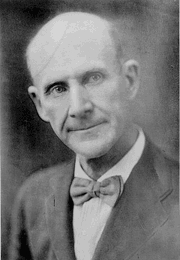On this date in 1855, labor leader, reformer and socialist Eugene Victor Debs was born in Terre Haute, Ind. He was not baptized by his formerly Catholic mother. The family living room contained busts of Voltaire and Rousseau. When a teacher gave Debs a bible as an academic award, inscribing it “Read and obey,” Debs later recalled, “I never did either.” (New York Call interviews with David Karsner) He dropped out of high school at age 14 to work.
By 1870 he had become a fireman on the railroad, attending evening classes at a business college. His labor activism began in 1875. As president of the Occidental Literary Club of Terre Haute, Debs brought “the Great Agnostic” Col. Robert Ingersoll, whom he always revered despite political differences, Susan B. Anthony and other famous speakers to town. He was elected to the Indiana General Assembly as a Democrat in 1884 while continuing his labor activities. He married Kate Metzel in 1885. They never had children.
As editor of the Locomotive Fireman’s journal for many years, Debs routinely attacked the church, promoted women’s and racial equality and promoted justice for the poor. “If I were hungry and friendless today, I would rather take my chances with a saloon-keeper than with the average preacher,” Debs once said. (Cited in Eugene V. Debs: A Man Unafraid McAlister Coleman, 1930.) He saved his strongest denunciations for the Catholic Church for being an anti-democratic, authoritarian “political machine.”
Debs organized the first U.S. industrial union, the American Railway Union in Chicago in 1893. It conducted a successful 1894 strike for 18 days against the Great Northern Railway. Debs and leaders of the union were arrested that same year during the Pullman strike and were jailed for contempt of court for six months. Debs ran for president as a Socialist Party candidate in 1900, 1904, 1908, 1912 and 1920.
He was associate editor from 1907-12 of the Appeal to Reason, a popular weekly published by freethinker E. Haldeman-Julius in Girard, Kansas. In 1918 he was arrested for an anti-war speech in Canton, Ohio, and was sentenced under the wartime espionage law to 10 years in prison and loss of citizenship. While in prison he was nominated for president and conducted his last campaign, winning nearly a million votes.
President Warren G. Harding commuted Debs’ sentence and released him on Dec. 25, 1921. He was welcomed by 1,000 Terre Hauteans upon his return. His health broken by his imprisonment, he died at age 70 in a sanitarium. The Terre Haute home he built with his wife in 1890 is a National Historic Landmark of the National Park Service and a museum. (D. 1926)


